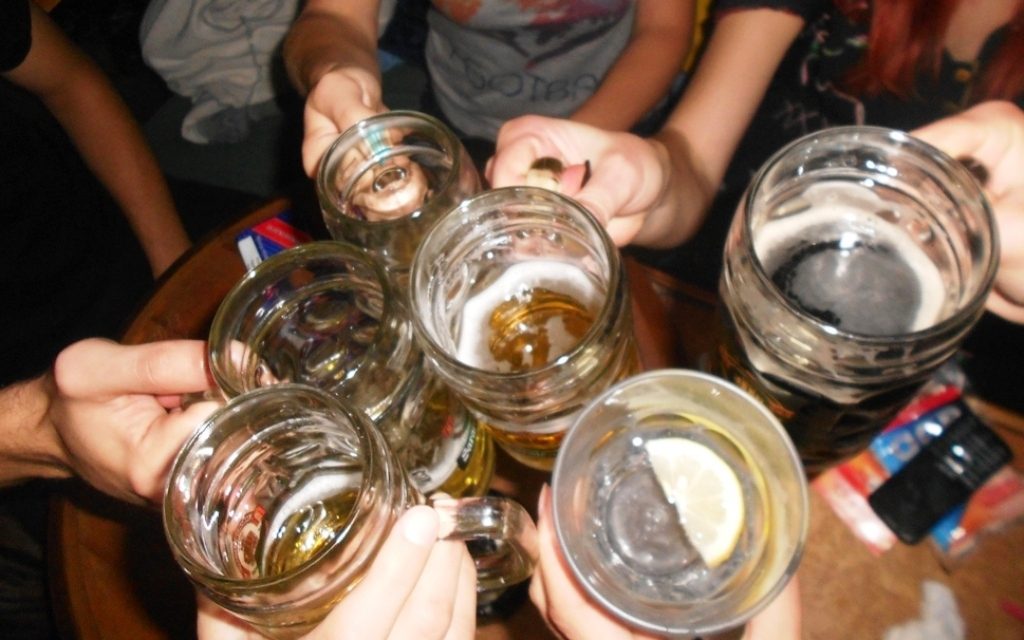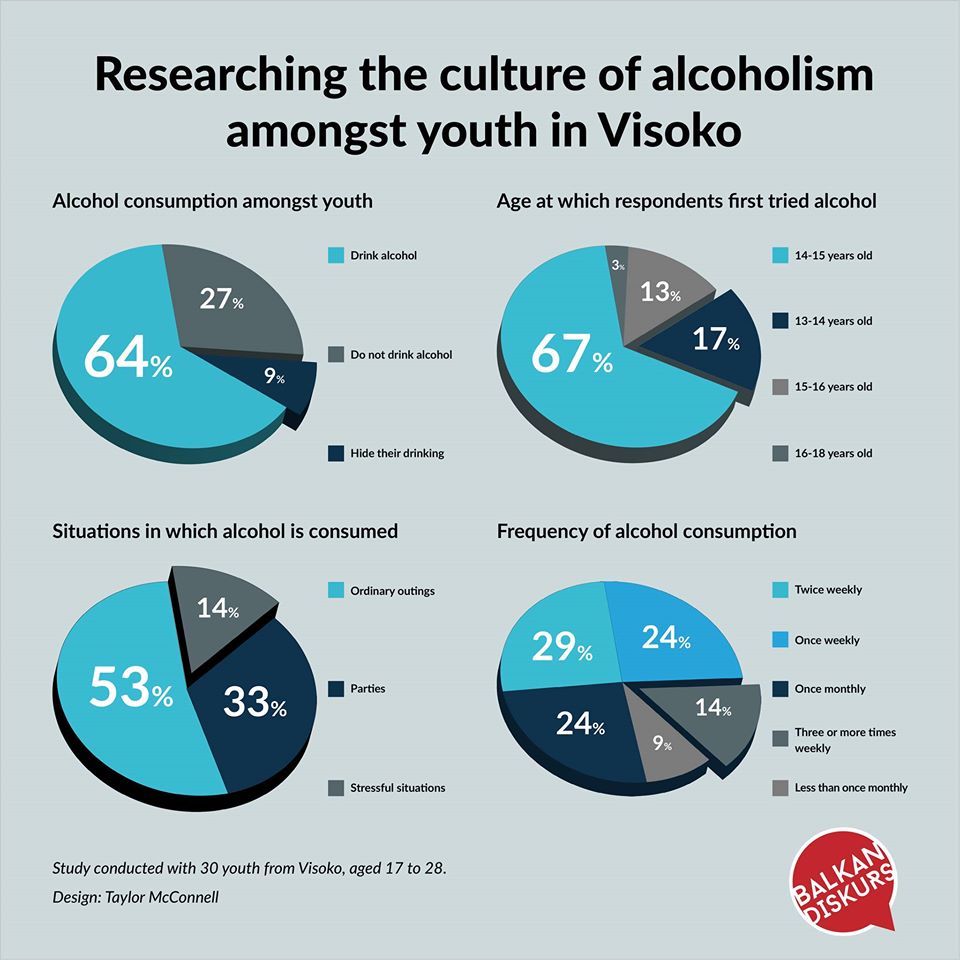
Lejla Bečar speaks with young people from Visoko about their views on alcoholism.
I am certain that everyone in Bosnia-Herzegovina, and probably everyone in the Balkans as well, have heard there is nothing healthier than to drink a shot of rakija first thing in the morning. This mantra, one that most children grow up with, has left its mark. I wonder: Will listening to alcohol being presented as a cure such as this, rather than a vice, result in a new generation of alcoholics?
Young people in Visoko divide themselves into three groups: Those who drink alcohol, those who hide their drinking and those who do not drink at all. If you talk to young people, you will find that almost all tried it for the first time when they were 13-18 years old.
Although selling alcohol to minors is forbidden by law, young people can buy it in most stores in Visoko without any problems. Nor will they have any issues ordering it in the most popular cafes.
Psychologist Nejra Dlakić cited the negative influence of young people’s surroundings as a cause of underage alcohol consumption, saying adolescents are “bombarded” with phrases such as “solace is in the glass,,” “drink-relax” and “drink to forget.”
“Song lyrics, regardless of whether they come from turbo folk, punk, rock or some other music genre, are full of calls to consume alcohol, glorifying the effects of beer, vodka or brandy. In that period of life, when young people are trying to find their place in the world, belonging to a certain group is something that everyone longs for, though in many cases this is unfortunately conditional upon a willingness to consume alcohol,” said Dlakić.
According to Dlakić, young people who have not yet reached maturity often fold to peer pressure, adopting drinking as a prerequisite to having a good time.
“Regardless of whether we’re referring to men or women, insecure people are vulnerable to pressure from their surroundings, but they are also inclined to reach for alcohol of their own accord, because they are convinced it is a solution at any given moment,” said Dlakić, adding that only a small number of people change the habits formed during this period of life.
The main reason given for those who have tried alcohol and stopped is often religion.
“When I was a teenager I was curious and impressionable and I consumed alcohol to fit in with others. However, I was raised in an Islamic family and was always aware that alcohol was forbidden. It gets you drunk and you lose your common sense,” said a student who considers himself to be a mature person and no longer drinks alcohol.
Adisa (24) also tried alcohol, but did not like it and does not drink it.
“Among my friends almost everyone drinks alcohol, mostly on weekends. I am there with them, but don’t see the appeal of alcohol, so I don’t drink it,” said Adisa, adding that she has no problems fitting in despite not drinking.
However, Nermin (21) admits that he started drinking to fit in with his friends, even though he did not enjoy it at all in the beginning. Today he thinks that there is no good party without alcohol.
“We usually ‘warm up’ with [a] few beers in Visoko, sometimes in the park, sometimes in bars, and then we go and party in Kiseljak, Kakanj or Sarajevo, because Visoko is dead after 11pm,” he said, emphasizing that no good story begins with drinking tea.
In regard to young people who do not drink, Nermin said: “They don’t know what they are missing.” Although he says he cannot imagine a good time without alcohol, Nermin is not worried about becoming an alcoholic. “I don’t drink as much or as often as alcoholics do, and even if I wanted to, I don’t have enough money for it,” he explains.
 Most young people we talked to in Visoko typically consume alcohol two or three times a week and on holidays. When asked, “what does drinking represent for you?,” they typically answered, “relaxation and self-confidence.”
Most young people we talked to in Visoko typically consume alcohol two or three times a week and on holidays. When asked, “what does drinking represent for you?,” they typically answered, “relaxation and self-confidence.”
Many of those who consume alcohol and hide it are girls who are trying to maintain a certain public image and are striving to meet the expectations of their parents. They explain that they drink only in certain surroundings and in places where no one can see them. On weekends their routine is to drink wine in a park or at home when their parents are not there, then go to bars and drink soft drinks. They think that their parents would make a fuss about their alcohol consumption for religious reasons, claiming that they like drinking alcohol because it relaxes them and breaks the monotony of living in a small town.
Ajla (19) said that, despite having strict parents and a religious upbringing, she sees alcohol as the best solution for relaxing when she is nervous and has stage fright.
“There is always a hidden bottle of cherry brandy in my room when my exams start. It is the only solution to kill the jitters,” said Ajla, emphasizing that she does not drink socially, except for on some special occasions. She is aware that reaching for alcohol is not an ideal solution, but she hopes to get rid of this habit once she finishes studying.
What was common among all interviewees, regardless of whether they drank alcohol or not, was that they had contact with a person suffering from alcoholism. Everyone had at least one example of an alcoholic in their family or neighborhood.
So do young people think they can become alcoholics? Surprisingly, most still feel that it will not happen to them. Young people do not approve of alcoholism, but they also view it with a large dose of humor. Only those that were actually living with alcoholics saw alcoholism in its truest form – as comparable to an addiction to hard drugs.
Alcoholism is now a socially acceptable disease that will be inherited by the new generations who are unconsciously plunging into the abyss of excessive drinking, not realizing the chain reaction that is triggered. Creating a myth about alcohol as medicine and making it a socially acceptable disease is opening the door for young people to experience the hell of addiction without knowing that the risks are increasing every time they decide to take “one more’’ drink.






